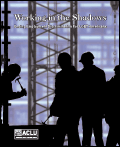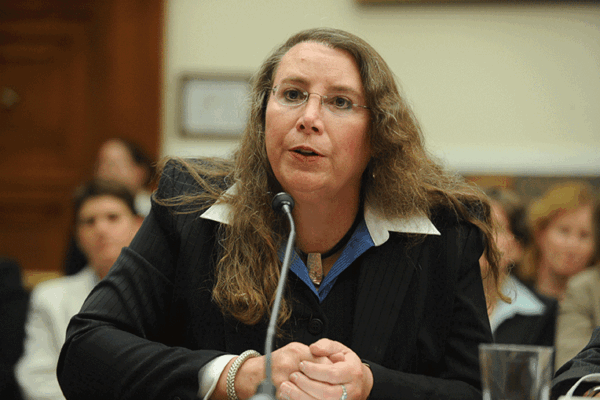New ACLU Report, Working in the Shadows, Explains Why Congress Should Pass the Employment Non-Discrimination Act
Details Stories of LGBT People from Across the Country Who Have Faced Workplace Discrimination
FOR IMMEDIATE RELEASE
Contact: media@aclu.org

DOWNLOAD
> Click here for a PDF
LEARN MORE
> About ENDA
WASHINGTON – The American Civil Liberties Union issued a report today that shows why Congress should pass the Employment Non-Discrimination Act (ENDA). The act is expected to be voted out of committee later this month. Working in the Shadows: Ending Employment Discrimination for LGBT Americans uses the stories of workers from across the country who have experienced workplace discrimination based on sexual orientation and gender identity to make the case for passage of the bill.
"Everyone should have an equal opportunity to find and keep a job to support their families," said Deborah J. Vagins, Policy Counsel for Civil Rights and Civil Liberties for the Washington Legislative Office of the ACLU, who authored the report. “But as we learned all too clearly as we began researching this report, there are many unfair barriers for far too many lesbian, gay, bisexual and transgender workers. We’re hopeful that the stories highlighted in Working in the Shadows will persuade Congress that it must make outlaw discrimination based on sexual orientation and gender identity.
The report notes that it is now possible to fire or refuse to hire someone for being lesbian, gay and bisexual in 30 states, while transgender workers can be denied or refused jobs in 38 states. ENDA, which was introduced in the House earlier this year, would prohibit discrimination based on sexual orientation and gender identity in most workplaces. The bill is similar to other federal civil rights laws barring workplace discrimination based on race, color, religion, sex, national origin, age and disability. A pdf of the report is available at www.aclu.org/pdfs/lgbt/enda_20070917.pdf.
The most poignant section of Working in the Shadows contains stories of people who have experienced discrimination themselves, including:
- Single mother Jacinda Meyer worked as a licensed insurance agent in Southern California. During her first nine months on the job, the company gave her positive feedback about her performance and a raise. But soon after her boss learned that she was a lesbian, she was fired. She later applied for a job with a “sister company” and after several interviews and personality and placement testing, they made her a verbal offer. The next day, she received a call rescinding the offer.
- Before transitioning from male to female, Diane Schroer was a decorated U.S. Army Special Forces officer who completed 450 parachute jumps into some of the world’s most dangerous places during her 25 years of service. She was handpicked to head up a classified national security operation and briefed Vice President Cheney. After retiring from the military, she wanted to capitalize on her experience fighting terrorism and applied for a job with a large federal agency library in Washington, D.C., as a senior terrorism research analyst. She received an offer shortly after the interview and accepted the position. Prior to starting work, Schroer invited her new boss to lunch to explain that she was transgender and would like to begin the job as a woman. The next day, the director called Schroer and rescinded the offer because she wasn’t a "good fit."
- Thomas Bryant worked for a temporary staffing agency in Indiana where he was viewed as a good employee and was responsible for training 50 new workers. Bryant, who was honest about the fact that he was gay when asked, had a co-worker who repeatedly made comments about “fags” in front of him. After complaints to his supervisor were ignored, Bryant complained to human resources. After a meeting with HR and the other employee, Bryant thought the problem was resolved. The next day, Bryant was fired.
- Susan Bresson, also of Indiana, worked as an assistant controller at a company that provides job placement services. Six weeks into her training, Susan filled out her life insurance paperwork and listed her female partner as her beneficiary. Three days later she was fired.
- Alex Gorinsky was a manager for a finance leasing company in the railroad industry in Texas. Alex worked for the company for five years, during which time he was promoted and received consistent positive reviews. After being with his partner for three years, Alex no longer felt like hiding such an important part of his life, so he decided to bring his partner to the office Christmas party. Three weeks later, he was laid off.
- Brooke Waits worked as an inventory control manager for a cell phone vendor in Texas. Brooke’s manager opened Waits’ cell phone and saw a picture of Waits and her partner sharing a New Year’s Eve kiss. The next day she was fired.
Every day, LGBT people across the country are forced to go to work, deny their families and hide who they are. Yet even then, they live in fear that they will slip up or someone will discover who they really are,” continued Vagins. “It’s time for Congress to send a clear message that, like other forms of discrimination, discrimination based on sexual orientation and gender identity is wrong. ENDA will allow all American workers who stand side-by-side at the workplace to also stand on the same footing in eyes of the law."
Banning workplace discrimination enjoys strong support in the country. In 1996, ENDA came within one vote of passage in the Senate. A May 2007 poll conducted by Gallup found that 89% of Americans believe that gay men and lesbians should have equal rights in the workplace.
A copy of Working in the Shadows and additional information about ENDA including a link to coverage of a recent hearing is available at www.aclu.org/enda.
Related Documents



